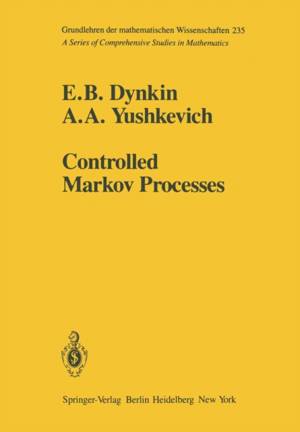
- Afhalen na 1 uur in een winkel met voorraad
- Gratis thuislevering in België vanaf € 30
- Ruim aanbod met 7 miljoen producten
- Afhalen na 1 uur in een winkel met voorraad
- Gratis thuislevering in België vanaf € 30
- Ruim aanbod met 7 miljoen producten
Zoeken
Omschrijving
This book is devoted to the systematic exposition of the contemporary theory of controlled Markov processes with discrete time parameter or in another termi- nology multistage Markovian decision processes. We discuss the applications of this theory to various concrete problems. Particular attention is paid to mathe- matical models of economic planning, taking account of stochastic factors. The authors strove to construct the exposition in such a way that a reader interested in the applications can get through the book with a minimal mathe- matical apparatus. On the other hand, a mathematician will find, in the appropriate chapters, a rigorous theory of general control models, based on advanced measure theory, analytic set theory, measurable selection theorems, and so forth. We have abstained from the manner of presentation of many mathematical monographs, in which one presents immediately the most general situation and only then discusses simpler special cases and examples. Wishing to separate out difficulties, we introduce new concepts and ideas in the simplest setting, where they already begin to work. Thus, before considering control problems on an infinite time interval, we investigate in detail the case of the finite interval. Here we first study in detail models with finite state and action spaces-a case not requiring a departure from the realm of elementary mathematics, and at the same time illustrating the most important principles of the theory.
Specificaties
Betrokkenen
- Auteur(s):
- Vertaler(s):
- Uitgeverij:
Inhoud
- Aantal bladzijden:
- 292
- Taal:
- Engels
- Reeks:
- Reeksnummer:
- nr. 235
Eigenschappen
- Productcode (EAN):
- 9781461567486
- Verschijningsdatum:
- 13/04/2012
- Uitvoering:
- Paperback
- Formaat:
- Trade paperback (VS)
- Afmetingen:
- 170 mm x 244 mm
- Gewicht:
- 498 g

Alleen bij Standaard Boekhandel
+ 223 punten op je klantenkaart van Standaard Boekhandel
Beoordelingen
We publiceren alleen reviews die voldoen aan de voorwaarden voor reviews. Bekijk onze voorwaarden voor reviews.







